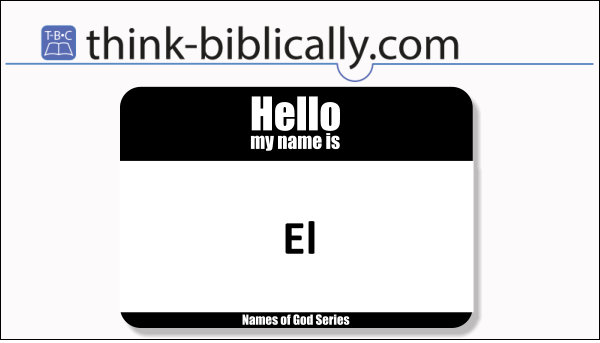By Tyson Thorne

One of the oldest names for God is simply El, perhaps meaning “the strong one”, and pronounced with a short “e” as one would expect. We say “perhaps meaning” as there is some doubt among modern scholars that the formerly accepted root of this word is correct. Rather, it appears to be a generic word for God in many ancient languages including Hebrew, Aramaic, Assyrian, Phoenician, and some South-Arabian dialects. In the Tanakh, the names El and Elohim always refer to YHWH. This name is used some 250 times throughout the Old Testament and is usually translated impersonally as “God”.
Perhaps the best way to understand the name is through the Bible itself. In Exodus 6 God explains:
God spoke to Moses and said to him, “I am YHWH. I appeared to Abraham, to Isaac, and to Jacob as El-Shaddai, but by my name YHWH I was not known to them.
In this instance, the first use of the name YHWH, we see that progressive nature of the way God reveals himself. In the opening chapters of Genesis God is simply known as El, then with Abraham and his sons and grandsons he is known as El-Shaddai, and now in Exodus we receive God's personal name YHWH. By approaching Moses with his personal name God is providing encouragement. By the use of YHWH Moses understands that his God is the one who is always present; God can guarantee the future because he is eternal and never changing; YHWH remains always.
As we've discovered already, El is a rather generic term for "God" used around the Near East from the most ancient times. This name is not used exclusively of YHWH in the Bible either. It is sometimes used of pagan gods and even "mighty men", going back to the basic definition of "the strong one". For this reason most of the time El is used for YHWH it is accompanied by an addition, a modifier, such as -Shaddai that we mentioned earlier. Abraham started serving the Lord as El, but learned more about God when he was visited by Melchizedek in Genesis 14. The priest referred to God as El-Elyon (meaning "Most High" or "Possessor of Heaven and Earth"). Abraham replies in kind, calling God El-Elyon in the same passage. For this reason many of the name we will be studying from this point forward will be compound names beginning with El-.